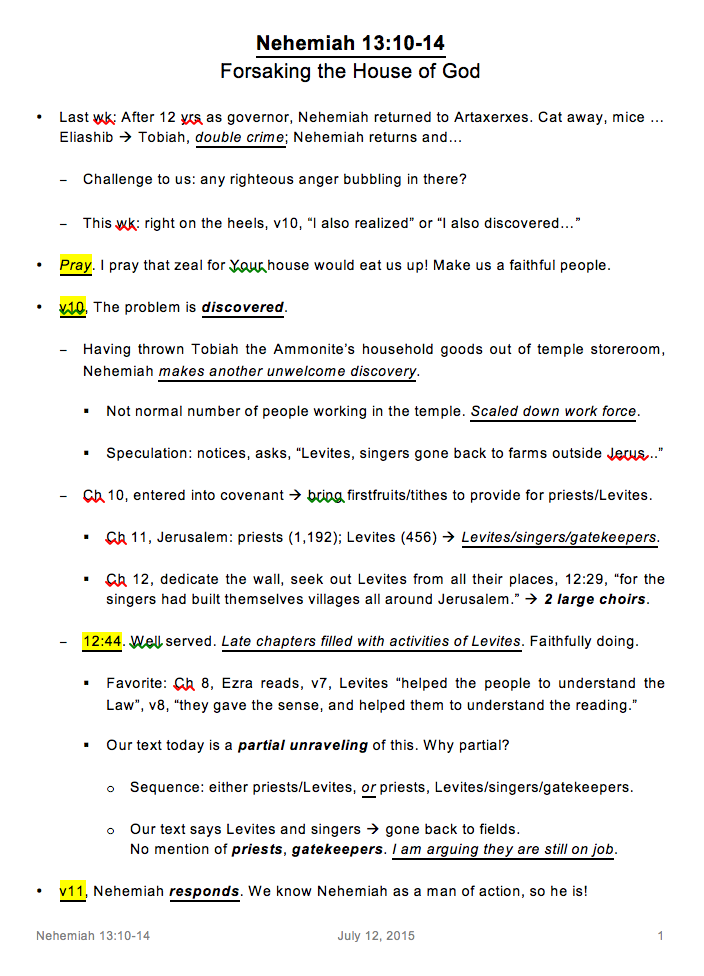Dear Sovereign Redeemer and other friends,
A daunting task: writing a sound, expository sermon to be delivered to the Lord’s people. That’s why it’s so daunting. They are His people. He bought them with His own blood. It is His word. He gave it as a good gift, without a jot or tittle of imperfection. And yet it is also exhilarating work, where so often the preacher can sense being helped in a unique way.
Without question, the hours I spend writing a sermon are among my favorite hours of the week, usually including Saturday evening and then early Sunday morning. Here are a few thoughts about how I spend these hours:
- I write the sermon with an open Bible and a keyboard. Yes, I have a detailed, multi-page study file, but I set it aside. I refer to it at end, to make sure I haven’t missed something I really wanted to include, but I don’t want to be directed by it in the sermon writing process. I want to prayerfully pour over the sermon text and work to express what I’ve learned in a clear, compelling way.
- I limit myself to three pages. Three and only three, with virtually no exceptions. I have backed down to that from double that number over the past four years, but I am very committed to this limitation, at least for now. That means I am preaching from a skeleton, trusting that the flesh is in my head and ready for use. That means I am working from words and phrases, not sentences and paragraphs. I find myself freer in my preaching taking this approach.
- I generally use the same format. The format is this: introduction, including a quick review of the preceding text, prayer, a careful exposition of clearly delineated subsections of the text, then applications. I am very systematic when I preach. You can tell I am preaching from an outline. Engineers usually like it. Artists not so much.
- I am conscious of finding Jesus in the text. Since Jesus is the ultimate fulfillment of the promises and prophecies of Scripture, and the ultimate source of life for all the people of God, I always try to find the most direct path to Him from the sermon text – Old Testament or New. There are gratuitous and unsound ways to go about this, by the way, which encourage further misuse of Scripture by the hearers, so I work hard not to stretch texts just to get to Christ. The sound paths to Jesus are more than sufficient.
- I try my best to stay focused on the main point of the text. I am amazed at how easy it is to miss the mark on this – and how many times I have! When I was preparing to preach my first sermons, my mentor Scott Brown would ask me this question early in the week: “If you had to boil this text down to one irreducible sentence, what would it be?” We always need to have a good answer for that question, and then our hearers should be able to give that answer at the end of the sermon.
- I work to come up with a very fitting title. The title matters. I used to think otherwise, but I have definitely changed my mind. This goes back to having the main point crystal clear in my mind, and being able to boil the text down to the most critical essentials. I know I have a good title when it makes sense to refer to it a couple of times during the sermon. With a not-so-good title, there won’t be much point in referring to it after the first 30 seconds of the sermon.
Most of these have little or no theological importance, and I’m confident there are better preachers who use very different approaches. Again, I offer what I do to stimulate thought.
For this series of posts, I continue to use a recent sermon that I preached on Nehemiah 13:10-14 titled “Forsaking the House of God” as an example. Here is what my sermon file looked like:
If you want to see the whole file, you can access it here.
On an average week, writing the sermon requires 3-4 hours of work.
One post remains: “Thoughts on Preaching”.

